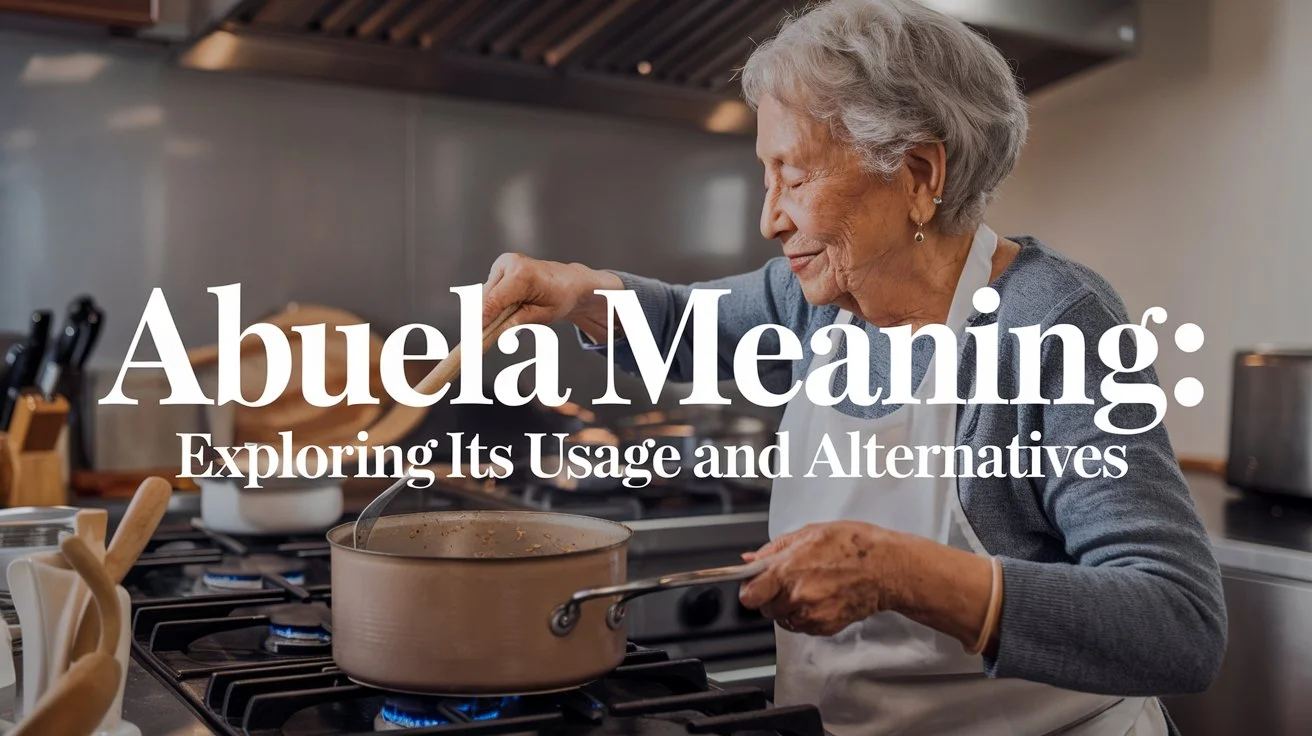Introduction
The word “abuela” is a Spanish term that directly translates to “grandmother” in English. However, beyond its basic meaning, the term carries significant cultural, emotional, and linguistic depth. It is often used not just to refer to a biological grandmother but also as a term of respect or affection for elderly women in Spanish-speaking communities.
In this article, we will explore the different meanings of “Abuela”, its cultural significance, and alternative ways to express the concept of “grandmother” in both formal and informal settings. Whether you’re learning Spanish, communicating with native speakers, or simply interested in linguistic variations, this guide will help you understand how and when to use “Abuela” correctly.
What Does “Abuela” Mean?
At its core, “abuela” means “grandmother” in Spanish. It is the feminine form of “abuelo” (grandfather). The word is widely used across Spain, Latin America, and Spanish-speaking communities worldwide.
However, “Abuela” can have additional meanings beyond just referring to a family member:
- A Term of Endearment – Just like “grandma” or “nana” in English, “Abuela” is often used as a loving way to address one’s grandmother.
- A Symbol of Wisdom – In many cultures, grandmothers are seen as sources of knowledge and life experience. “Abuela” can symbolize wisdom, guidance, and tradition.
- A Community Figure – In some Spanish-speaking cultures, an “Abuela” might not be a biological relative but rather an elder who plays an important role in a neighborhood or family.
Cultural Significance of “Abuela”
The role of an abuela extends beyond family. In many Hispanic cultures, grandmothers often serve as the matriarchs of the family, providing support, advice, and love to multiple generations.
- In Mexican culture, an abuela is often seen as the heart of the family, responsible for passing down traditions, family recipes, and cultural heritage.
- In Caribbean cultures, grandmothers often take on a parental role when parents are absent or working abroad.
- In Spain, an abuela is frequently involved in childcare, education, and even discipline within the household.
Understanding these cultural nuances is essential when using the word “abuela” in different contexts.
16+ Alternative Ways to Say “Abuela”
Depending on the formality, relationship, and cultural background, there are several alternatives to “abuela” that you can use in different situations.
1. Abuelita (Little Grandmother)
A common affectionate form, “abuelita”, adds the diminutive “-ita”, making it more endearing. It is often used in Latin America to express closeness and warmth.
💬 Example: “Mi abuelita cocina el mejor arroz con pollo.” (My grandma makes the best chicken and rice.)
2. Nana (Grandma/Nanny)
This informal and affectionate term is widely used in Spanish-speaking and English-speaking families.
💬 Example: “Voy a visitar a mi nana este fin de semana.” (I’m going to visit my grandma this weekend.)
3. Mamá Grande (Big Mom)
In some Latin American families, “mamá grande” is used to show respect and affection for an elderly grandmother figure.
💬 Example: “Mamá grande nos contó historias antes de dormir.” (Big Mom told us stories before bed.)
4. Yaya (Grandma – Spain & Catalonia)
In Spain, particularly in Catalonia, “yaya” is a common way to refer to a grandmother with love and respect.
💬 Example: “Mi yaya siempre me da dulces cuando la visito.” (My grandma always gives me sweets when I visit her.)
5. Mamita (Little Mom)
While this is often used to refer to one’s mother, in some cultures, it can also be used for grandmothers as a sign of deep respect.
💬 Example: “Mi mamita me enseñó a tejer.” (My grandma taught me how to knit.)
6. Tata (Grandma – Argentina & Mexico)
In Argentina and parts of Mexico, “tata” is a cute, affectionate way to refer to a grandmother.
💬 Example: “Mi tata hace la mejor sopa de pollo.” (My grandma makes the best chicken soup.)
7. Vieja (Old Lady – Affectionate in Some Contexts)
In some Spanish-speaking regions, “vieja” (old woman) is used playfully and lovingly to refer to a grandmother.
💬 Example: “Mi vieja todavía baila salsa.” (My grandma still dances salsa.)
8. Mamama (Grandmother – Peru & Bolivia)
Used in Peru and Bolivia, “mamama” is an affectionate term for grandmother.
💬 Example: “Mi mamama siempre tiene historias fascinantes.” (My grandma always has fascinating stories.)
9. Lola (Grandmother – Filipino Spanish Influence)
In the Philippines, where Spanish influence remains, “Lola” is the common word for grandmother.
💬 Example: “Mi lola me preparó mi comida favorita.” (My grandma prepared my favorite food.)
How to Choose the Right Alternative
When selecting the right term for “abuela”, consider the following:
✅ Cultural Background – Certain terms are more common in specific countries or regions.
✅ Level of Formality – Words like “Abuelita” are more affectionate, while “mamá grande” may sound more respectful.
✅ Relationship Closeness – Use “nana” or “yaya” if you have a close bond, but “abuela” in professional or formal settings.
11 Texting Examples for Everyday Use
1️⃣ “¡Hola, abuelita! ¿Cómo estás hoy?” (Hi, Grandma! How are you today?)
2️⃣ “Voy a casa de mi nana este fin de semana.” (I’m going to my grandma’s house this weekend.)
3️⃣ “Mi yaya me mandó un mensaje muy lindo.” (My grandma sent me a very sweet message.)
4️⃣ “Voy a visitar a mi tata mañana.” (I’m visiting my grandma tomorrow.)
5️⃣ “Mi mamama siempre me da consejos sabios.” (My grandma always gives me wise advice.)
6️⃣ “¡Lola me regaló mi postre favorito!” (Grandma gave me my favorite dessert!)
7️⃣ “Mamá grande nos preparó una cena deliciosa.” (Big Mom prepared us a delicious dinner.)
8️⃣ “Extraño a mi viejita, la llamaré más tarde.” (I miss my granny, I’ll call her later.)
9️⃣ “Mi abuela es la mejor cocinera del mundo.” (My grandma is the best cook in the world.)
🔟 “Siempre me divierto con mi mamita.” (I always have fun with my grandma.)
🔟 “Mi abuelita nos cuenta historias hermosas.” (My little grandma tells us beautiful stories.)
Final Thoughts
The word “Abuela” carries deep cultural and emotional significance, and there are many ways to express the idea of a grandmother in Spanish. Whether you use “Abuelita”, “nana”, or “Lola“, the key is to choose a term that reflects your relationship, culture, and level of formality.





